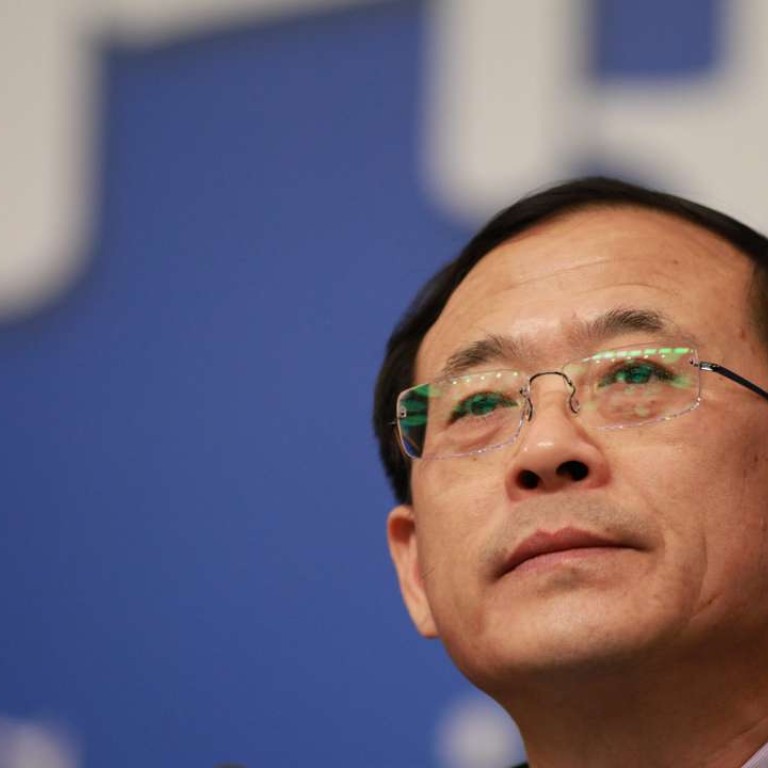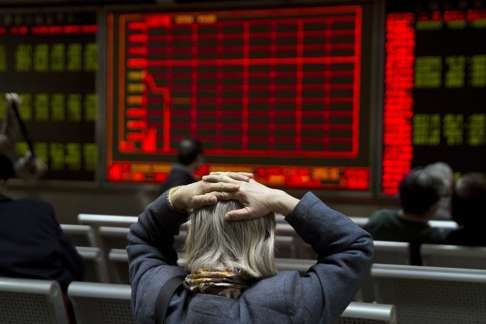
CSRC head may revive reform plans following ‘People’s Daily’ plaudits
Official endorsement of chairman’s efforts to protect retail investors following bruising crash could pave way for contentious reforms, bringing an emerging-industries board and new IPO mechanism
China Securities Regulatory Commission chairman Liu Shiyu has won kudos for the way retail investors have been protected, with People’s Dailypraising the regulatory boss in an upbeat commentary.
The endorsement by the Communist Party’s mouthpiece, about 10 months after Liu took the helm of the regulator, was more than just praise for his efforts to safeguard investors’ interests.
Rather, it may pave the way for the chairman to return the CSRC to the reform path after a year of stagnation.
Articles published on the flagship newspaper can represent the mainland leadership’s attitude.
Liu, 55, became CSRC chairman in late February and he was tasked with stabilising a beleaguered market amid a crisis of confidence.
The former head of the Agricultural Bank of China, after taking office, put a series of reform plans on ice , aiming to stem a market slide that caused millions of investors to lose money.

The benchmark Shanghai Composite Index has advanced nearly 10 per cent since Liu started leading the CSRC.
“He lived up to the expectations of stabilising the market,” Shanghai Shiva Investment hedge fund manager Zhou Ling said. “It will be a crucial year in 2017 as people expect the chairman to implement reforms after market stability is achieved.”
The People’s Daily said Liu’s promises to step up market policing resulted from his sober-minded decision to protect more than 100 million small investors.
“It was a project related to interests of millions of people,” the newspaper said. “It was also a project that could lay a solid foundation for the market’s long-term development.”
Liu replaced Xiao Gang as CSRC chairman when millions of investors vented their spleen toward regulators’ ill-fated policies that left them to carrying the empty bag after a market crash.
On the mainland, a sharp fall on the stock market is seen as a threat to the social order because most of the retail investors used years of savings to bet on fluctuating share prices, hoping to strike it rich quickly.
Xiao was blamed for implementing a “circuit breaker” mechanism that caused the trading suspension twice in the first week of this year with the benchmark diving 10 per cent amid a panic selling.
Between mid-June and late August last year, the A-share market suffered a losing streak that wiped out US$5 trillion (HK$38.8 trillion) capitalisation in line with a 44 per cent drop.
The position of CSRC chairman was seen as a hot seat for a minister-level official at the beginning of this year.

Liu abandoned a plan to create a board for emerging industries at the Shanghai Stock Exchange and delayed the launch of a registration-based initial public offering system after taking office.
He was surrounded by criticism because the two decisions were regarded as an about-face on market-based reforms.
Two sources close to the CSRC said the reform stall was temporary and Liu still hoped to carry out reforms to prove his calibre when the market fully stabilised.
A former CSRC official with knowledge of the regulator’s thinking said: “He still wanted to make things happen.
“But it might take some time before he entirely maps out detailed strategies and policies.”
Before the stock market rout last year, the leadership had encouraged the CSRC to ease the IPO procedures to make company fundraising easier.
It remains to be seen whether Liu will make renewed efforts to launch the board for emerging industries and permit the new IPO mechanism that could greatly fast-track new share sale approvals.
IPOs have long been a thorny issue on the mainland’s roller-coast market since its inception in 1990.
Dozens of companies were found to have conducted frauds in IPO application documents, which eventually led to massive losses by thousands of retail investors.
Before 2009, IPO shares were set artificially low to facilitate fundraising; investors flocked to chase new shares during their trading debuts seeking a handsome first-day gain.
The CSRC has let underwriters and companies set offering prices freely since 2009 but investors remained keen on chasing new shares amid a belief they could surge when trading started.
Most of the investors were later left to lick their sores as the first-day rally was followed by sharp falls.
Haitong Securities analyst Zhang Qi said: “An eased IPO system is still likely to spark buying craze among retail investors to chase the first-day gains.
“It will again turn out to be a harsh question facing chairman Liu if he decides to go back to the reform agenda.”

